ACMP supports the Afghan National Institute of Music
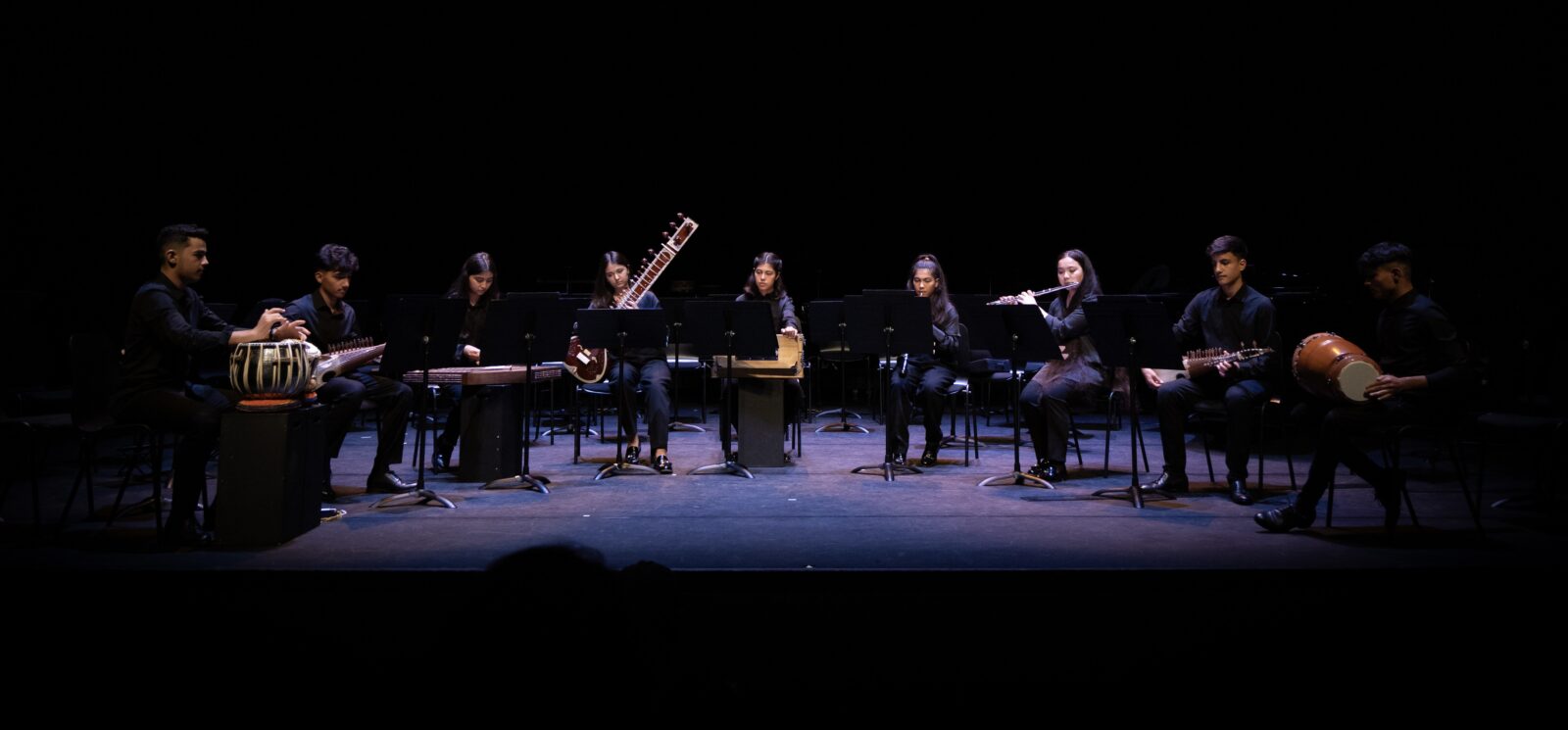
In addition to his busy life as an entrepreneur, investor, and active amateur cellist, ACMP member Seth Maerowitz (Brooklyn, NY), volunteers for the U.S.-based nonprofit Friends of ANIM (Afghan National Institute of Music.) Seth became involved with Friends of ANIM after meeting one of its board members, Lesley Rosenthal, through ACMP members David and Rebecca Sayles. In a recent phone conversation, he shared ANIM’s extraordinary story of resilience when the entire school was evacuated to Portugal after the fall of Kabul in 2021.
Watch Symphony of Courage, a half-hour documentary about the airlift to Portugal.
I was inspired to give an ACMP grant to ANIM in support of its chamber music programs. ACMP and ANIM share a common mission to provide access to chamber music to people of all backgrounds in all corners of the world. From ANIM’s website:
Ensemble playing is at the very heart of ANIM. Very simply, music brings people together. Through playing music together and listening to one another, the youth of Afghanistan can begin to heal their wounds and build strong bonds within Afghan society. Playing together in harmony teaches children to live in peace as a nation, no matter the ethnicity or background.
When children play in a musical ensemble they collaborate, listen, share, and contribute. ANIM’s ensembles are a microcosm of the future we hope to build in Afghanistan: a peaceful, thriving, vibrant, and dynamic society which embraces diversity and provides opportunities for all.
Seth introduced me to ANIM’s Founder and Director, Dr. Ahmad Sarmast, and I had the honor of meeting him on Zoom to talk about ANIM’s history and chamber music activities. Read an excerpt from my interview with Dr. Sarmast, below.
Stephanie Griffin (SG): Dr. Sarmast, thank you so much for joining me today. I’d love to start by asking you about the chamber music component of your program at the Afghan National Institute of Music.
Dr. Ahmad Sarmast (AS): We always give a significant importance to chamber music and chamber activity of our students. Back in Afghanistan, we had many small ensembles, and we also had a chamber orchestra. But since we arrived here in Portugal, we reestablished a number of chamber groups, as well as the Zohra Orchestra and the Afghan Youth Orchestra, which are the largest orchestras of our school. Currently our chamber activities mainly take the form of traditional music of Afghanistan. We’ve got a group which is called Azada. Azada is a nine-member ensemble of traditional Afghan instruments performing instrumental music of different ethnic groups of the people of Afghanistan, specially arranged for this ensemble. Also, the repertoire of the group consists of some solo pieces that normally they play as a prepared solo, or sometimes in arrangements for two or three players. The second chamber group receives a lot of invitations to travel and to perform in many European cities. Is called Taranum. It’s a seven-member group made up of our advanced students, and led by a faculty member who plays gijhak himself and performs with the group. This is an instrumental and vocal group specializing in semi-classical popular music, as well as in music of the different ethnic groups of Afghanistan.
SG: Thank you – that’s fascinating. I noticed on your website that in addition to instruction in Afghan traditional instruments, you also have a Western orchestra, and offer lessons in Western classical music at ANIM.
AS: Western classical music was the core program of the Afghanistan National Institute of Music, and we have been extremely committed to musical diversity. And also, I strongly believe that Western classical music is a heritage that belongs to all humanity and the Afghan people – Afghan children, Afghan youths and generally, every Afghan citizen should have access to the beauty of this music as well. So, the program of the school was made of two elements. One of these is Western classical music, where our students are learning a classical instrument alongside several music academic subjects such as ear training, music history, orchestration, composition. It begins with that program, and the curriculum changes as the students develop. But also, we have two large orchestras, the Zohra orchestra and the Afghan Youth Orchestra, which are completed by Western classical instruments. The repertoire of these orchestras is made of Western classical pieces, as well as Afghan music specially arranged for these orchestras. The specifics of these two orchestras is that in the makeup of the Western classical orchestra, we also incorporate Afghan traditional instruments. And each time we play a Western classical piece, it’s always a new arrangement that incorporates Afghan traditional along alongside Western classical instruments.
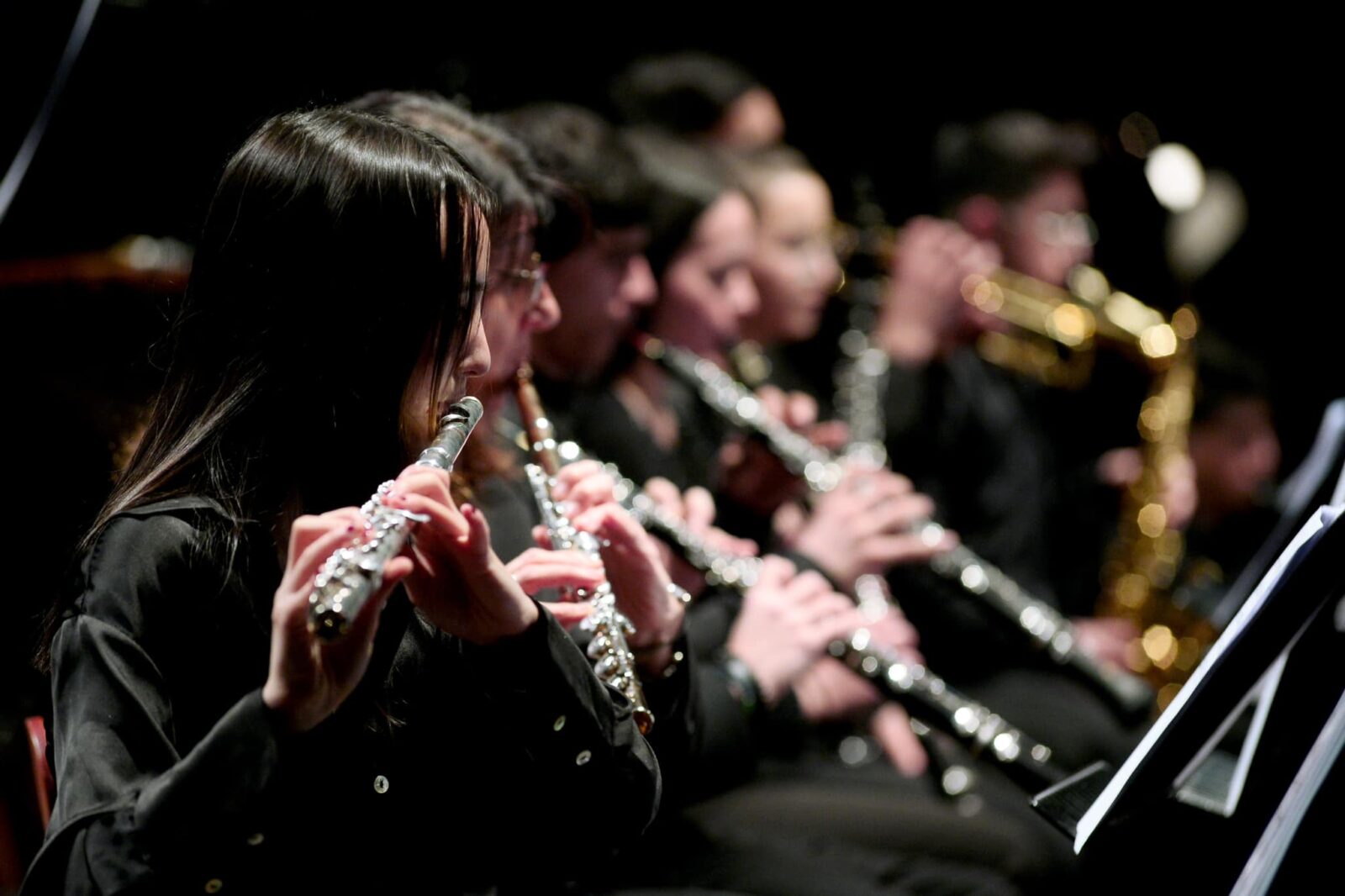
SG: You mentioned arrangements that have been made for both the chamber groups and your orchestras. Do you have composers on site that have been writing down some of these arrangements that combine Western musical instruments with Afghan classical instruments?
AS: Yes. All the arrangements are made by our own faculty. In different periods of time, different members of the faculty were involved, or they will be getting involved as needed. The music is arranged most of the time by the conductors. So currently, our conductor is arranging music for the Afghan Youth Orchestra and for the Zohra Orchestra. Everything is in notation – we’ve got the scores, and we’ve got parts for every instrument. It’s in a proper orchestration method, which is prevalent in the West.
SG: Will you ever be publishing some of these arrangements and making them available to people in other countries who might want to explore playing arrangements of Afghan classical music themselves?
AS: We would love to have those scores published, together with the parts, if there’s an opportunity and resources available for us to do so. And we would be happy to share with you the scores that we developed of Afghan as well as non-Afghan music. You would be most welcome to use them for your chamber activities on your side.
SG: Wonderful – thank you! In terms of chamber music, do you also have a program for teaching Western classical chamber music, such as traditional string quartets, piano trios and other standard ensemble types? If not, do you plan on developing that?
AS: Back in Afghanistan it was part of our educational activities and right now, that our students are studying in Portugal, this chamber music is an important element of their practical activities in the Braga Conservatory, where they continue their music education.
SG: Also, when I saw your website, I was very inspired by the number of women students that you have, and especially given Afghan history and the situation with the Taliban. Can you tell me a little bit more about your mission to include women and help Afghan women have access to music?
AS: A major commitment of our school and the mission of our school was also to make a contribution to gender equality, not only in Afghan society, but generally in music, and also to use the soft power of music and education for empowerment of girls and women. In order to achieve this goal, annually, we reserve 50% of the school’s new enrollment for the girls. And the girls’ enrollment was always a priority. We began in 2010 with one girl. But by the return of the Taliban, more than one-third of the student community was made up of girls. And the girls were beautifully presented in every large and small ensemble of our school, while at the same time we managed even to establish a 35-member all-women orchestra of Afghanistan called Zohra. And if you google Zohra Orchestra, you can see that was in high demand. In the last 14 to 16 years, it became a symbol of women’s emancipation and freedom of Afghan women and a symbol of Afghan women’s empowerment.
SG: Wow, that’s very inspiring! Could you tell us about the process of moving your school to Portugal and the local collaborations that you have with the Braga Conservatory there?
AS: Relocating the students and faculty of the Afghanistan National Institute of music was a huge, huge task in which many people were involved. This activity was led by the Friends of ANIM – our non-governmental organization from the United States. Thanks to Friends of ANIM, we managed to bring and form a huge coalition of people of good will which included human rights activists, women’s rights activists, music advocates, lawyers, legal firms, politicians, and big-name musicians such as Yo-Yo Ma. Thanks to this huge collaboration and this beautiful team, we managed eventually, after four months of working day and night, to pave the way for the evacuation of the entire school community out of Afghanistan. And in this process, we are very, very grateful to the government of Portugal, who was the only country who responded positively to our appeal and offered asylum to our group. But of course, the Government of Qatar played a significant role in facilitating and acting as a mediator between ANIM and the Taliban and paved the way for the evacuation of our group back in Afghanistan. It was the Government of Qatar and the diplomats of Qatar in Kabul who were troubleshooting, negotiating, and overcoming the challenges leading up to the evacuation.
SG: That was a very courageous move on your part. How about the students? When they moved to Portugal with you and the faculty, I presume they all had to leave their families behind in Afghanistan?
AS: Yes, we had at that time, in late August, received 282 asylum spaces for our group. Therefore, we were working very cautiously to make sure that no student was left behind in Kabul, but also to include all the faculty with their families and all the staff with their families. In this manner, we managed to get 273 people, but students were mainly traveling alone, without their families. And that was one of the major problems when we arrived to Portugal, because within our group, we had 73 unaccompanied minors. That was a big legal case that had to be solved with the intervention of the Family and Children Court of Portugal. Eventually, after almost eight months of negotiation between our lawyers, Portuguese social security and the court, a solution was found that allowed us to keep the group together united, not in one building, not in residential care, but close to each other. Everyone wanted to do what was in the best interest of the kids, and we made sure that they were able to study together, play together, and continue activities together. And that’s why we received a proposal from the government of Portugal to move to the north, to the city of Braga. We are very grateful to the conservatory of Braga, who very generously offered to receive all our students and to enroll all our students in the Braga Conservatory, as well as in the schools affiliated with Conservatory. The conservatory music program is activated in two major schools, primary and secondary schools, where our students would be studying until grade nine. And in grade 10, they will be moving to the conservatory. Right now, our students are between these two institutions. Such was the generosity of the Conservatory and the affiliated schools that they probably turned down many Portuguese students, but made sure that our students would be able to chase their dreams and continue their music education.
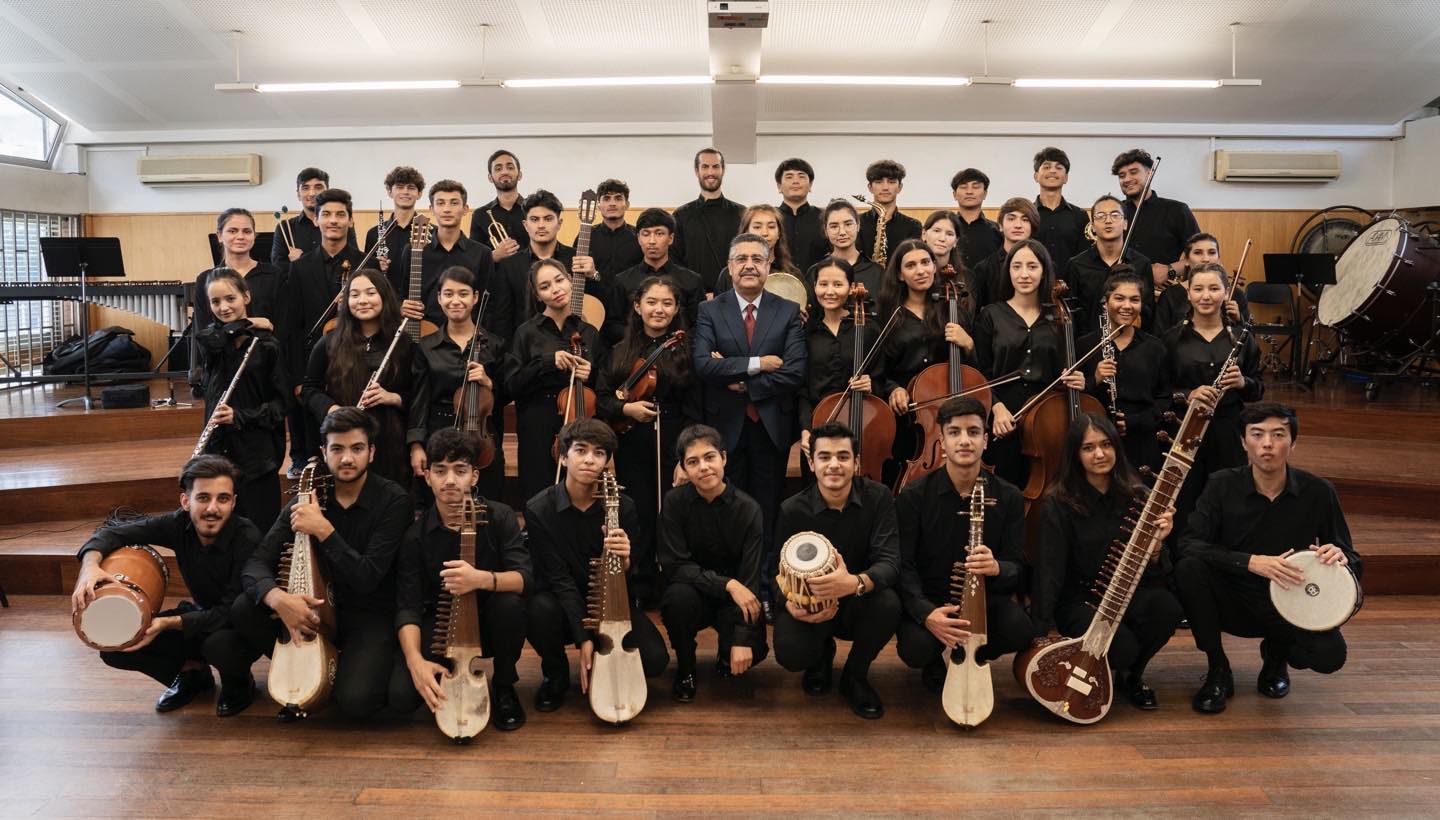
More Articles
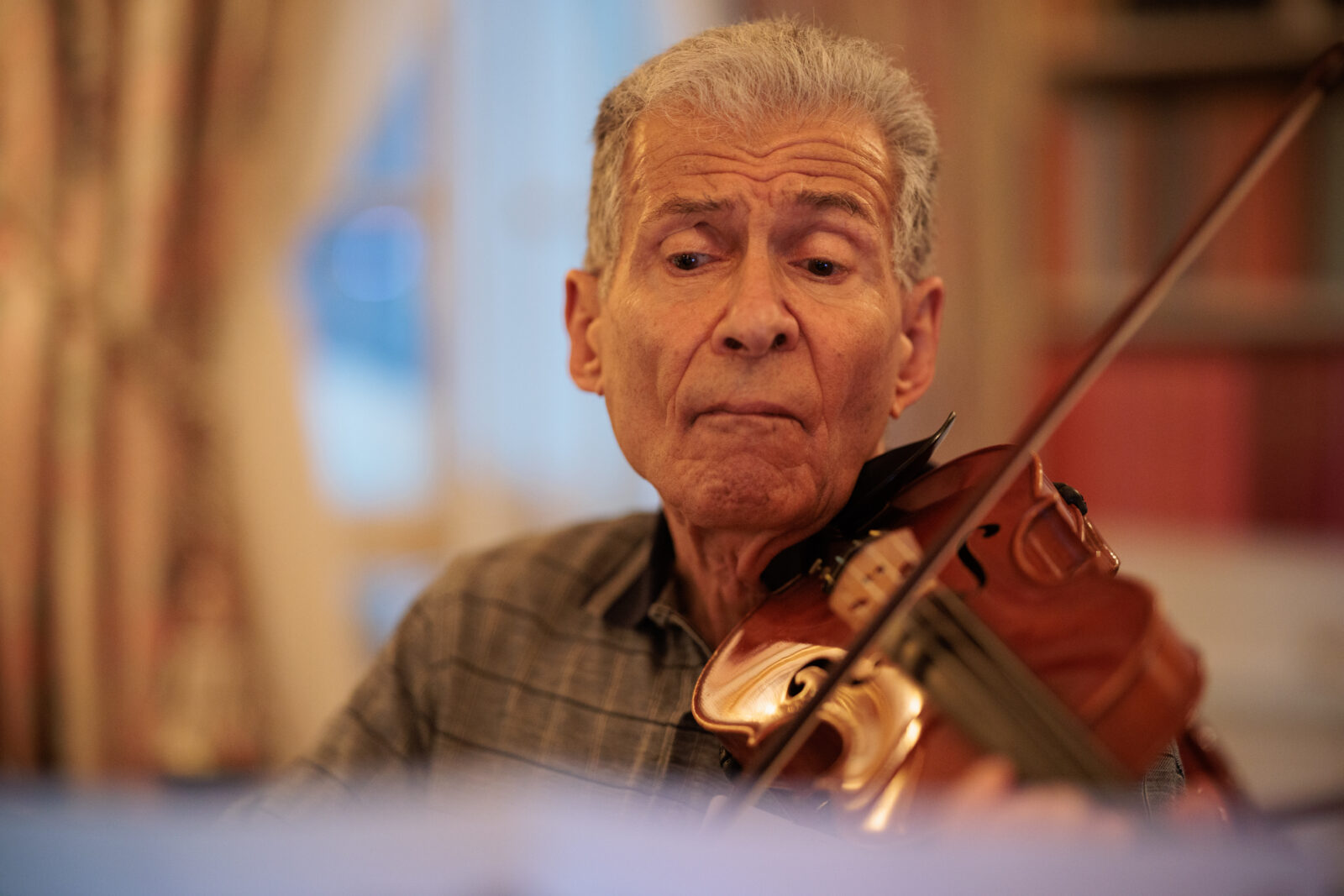
ACMP presents the 2025 Susan McIntosh Lloyd Award to the SoCal Chamber Music Workshop in memory of Ron Goldman
This past Fall ACMP gave its 2025 Susan McIntosh Lloyd Award for Excellence and Diversity in Chamber Music to the SoCal Chamber Music Workshop in honor and in memory of SoCal's founder and long-time ACMP board member Ron Goldman. Watch my interview with Julie Park and read Adam Birnbaum's touching tribute to Ron.Read More ↗
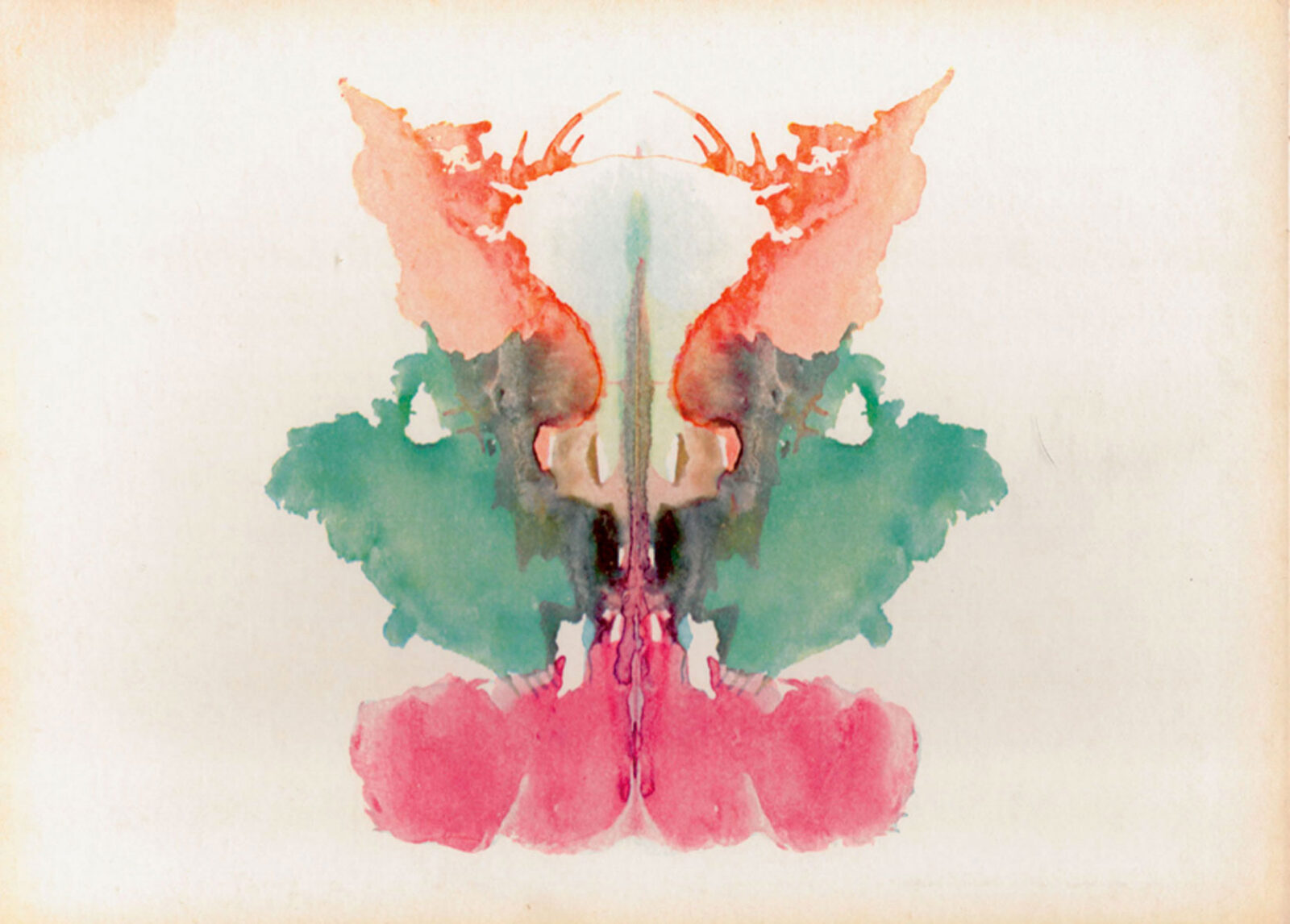
Turning ink blots into music – a discussion on the meaning and madness of notation
Join Cal Wiersma and a live string quartet for an illuminating class about decoding musical notation and translating it back into a musical line, live in Brooklyn and live-streamed on YouTube.Read More ↗

A New 5-Day Summer Home for Adult Chamber Musicians in Brevard
Brevard Music Center is launching the inaugural Adult Chamber Music Workshop, June 3-8, 2026, and we could not be more excited to welcome adult amateur musicians to our beautiful mountain campus in Western North Carolina. The program features focused rehearsal time, inspiring coaching, great colleagues at your stand, and the simple joy of spending time immersed in chamber music.Read More ↗
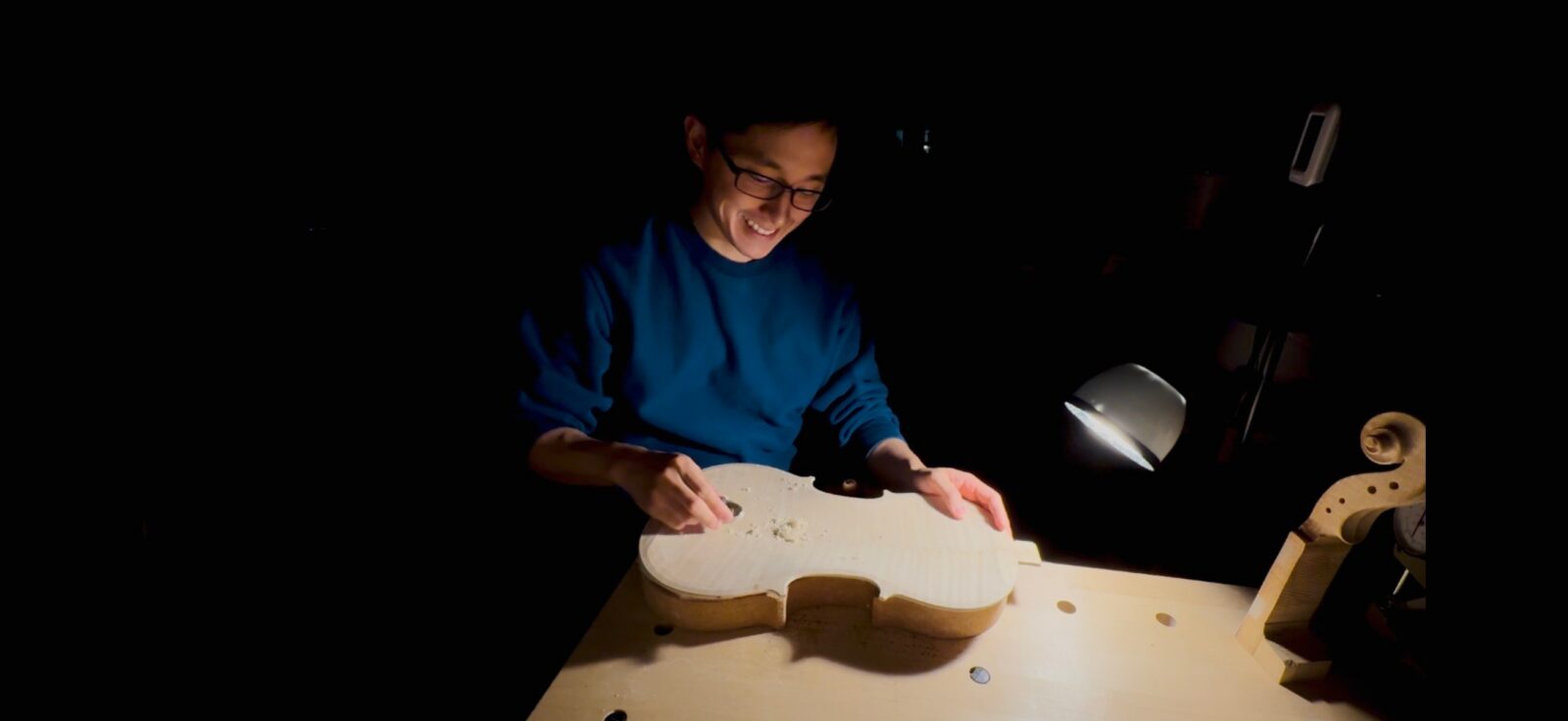
Charles Hsu – oncologist, violist, luthier
Charles Hsu has packed a lot into his 33 years. Born in the New Jersey, he grew up in Taiwan, moved back to the United States to attend MIT, and, after a stint as a management consultant, pursued his medical studies at Yale and Harvard. Today, he is Dr. Hsu, a junior attending medical oncologist at Memorial Sloan Kettering Cancer Center in New York. But through all of these pursuits, there is his love of chamber music.Read More ↗
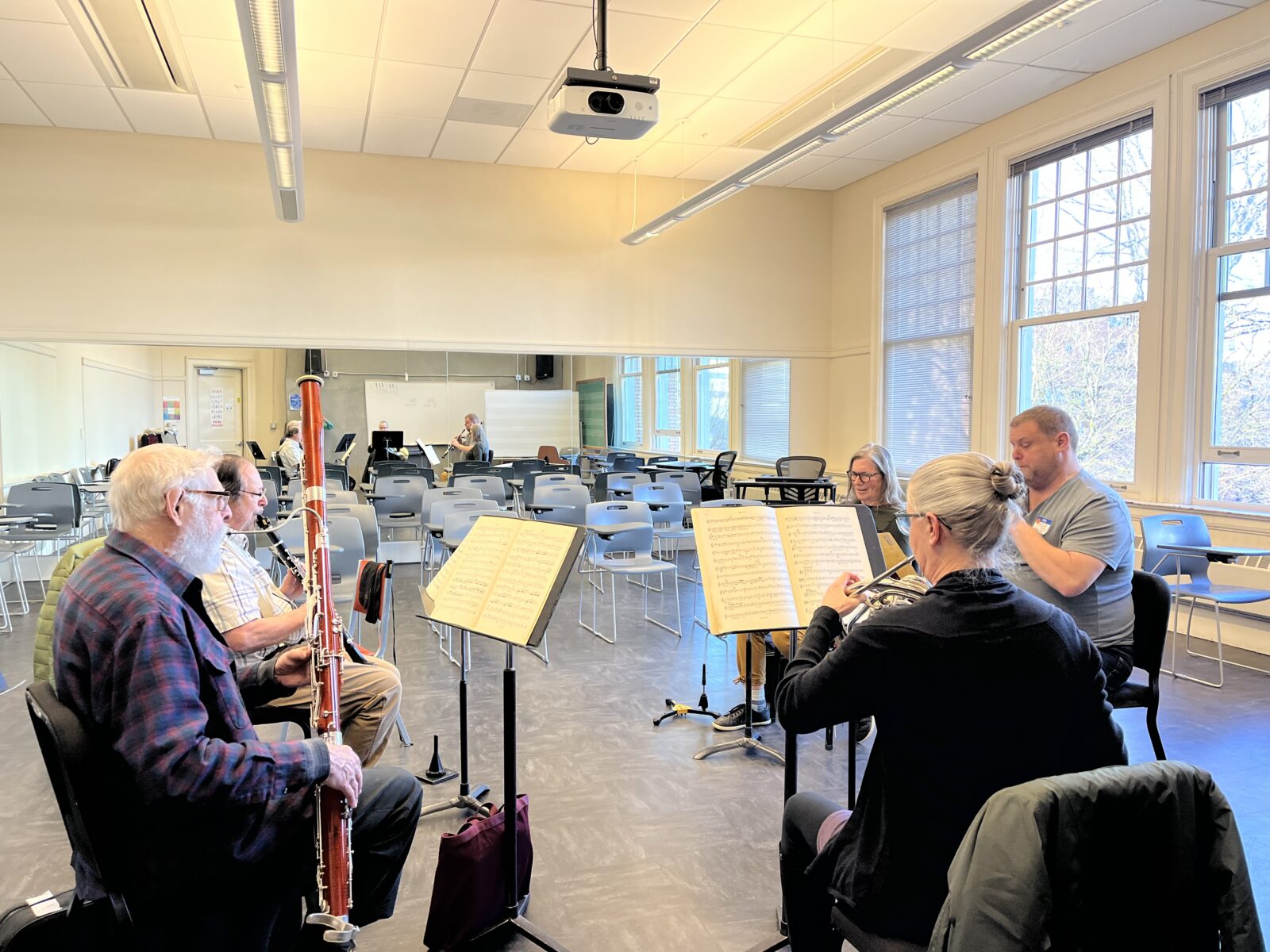
The Oregon-Washington ACMP Play-In
On January 17, 2026, 45 chamber musicians, ages 23-80, met at Portland State University's Music School Hall in Portland, Oregon for a Play-In organized by NAOC councilor Virginia Feldman.Read More ↗
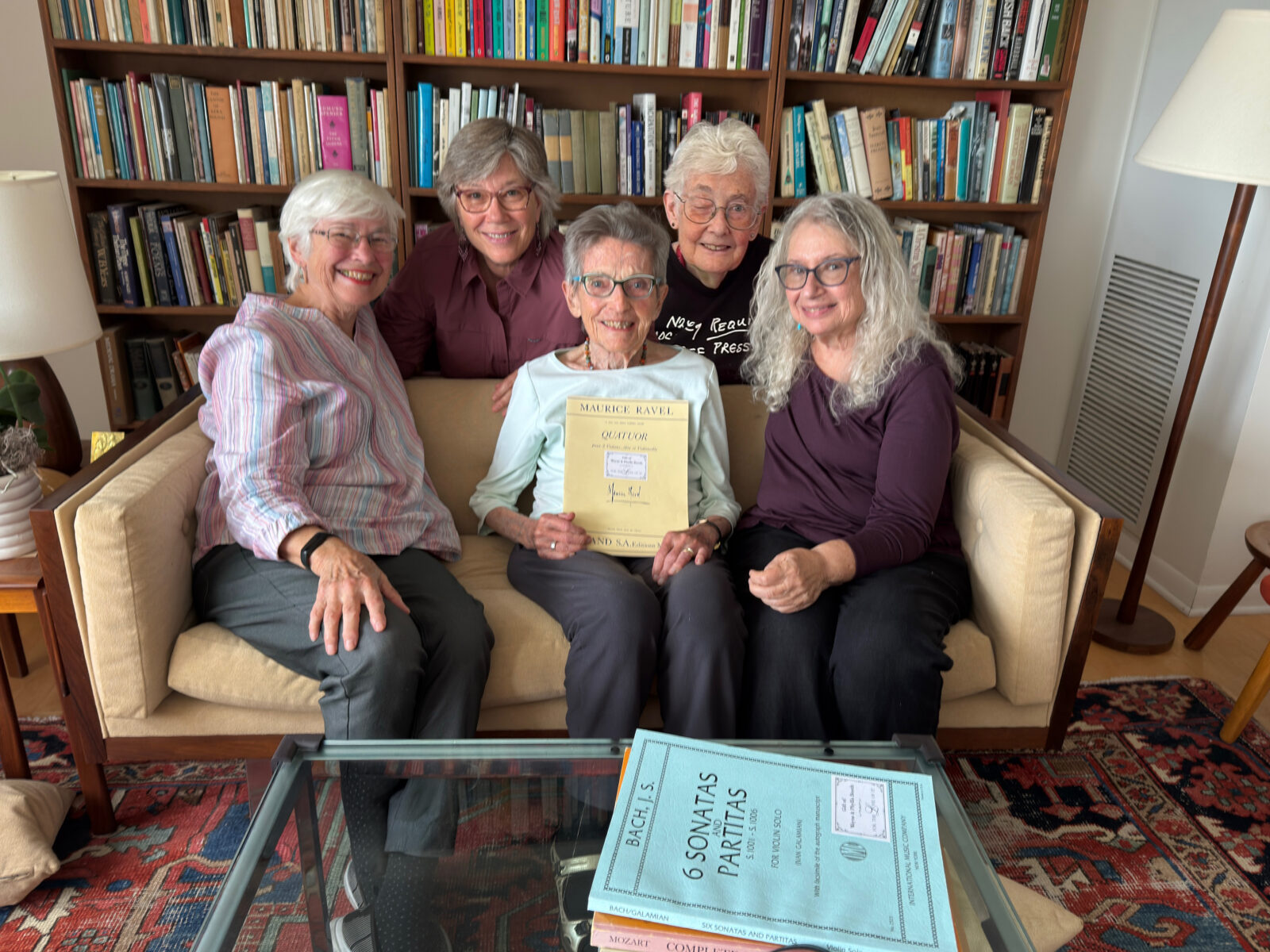
For the Love of It: A Legacy
What to do with all that music, when you finally, reluctantly, stop playing? At 99, Phyllis Booth decided to gift her collection to Golden Chamber Music at Sleepy Hollow, where she and her late husband Wayne Booth had a long, joyful connection since shortly after its founding in 1969.Read More ↗
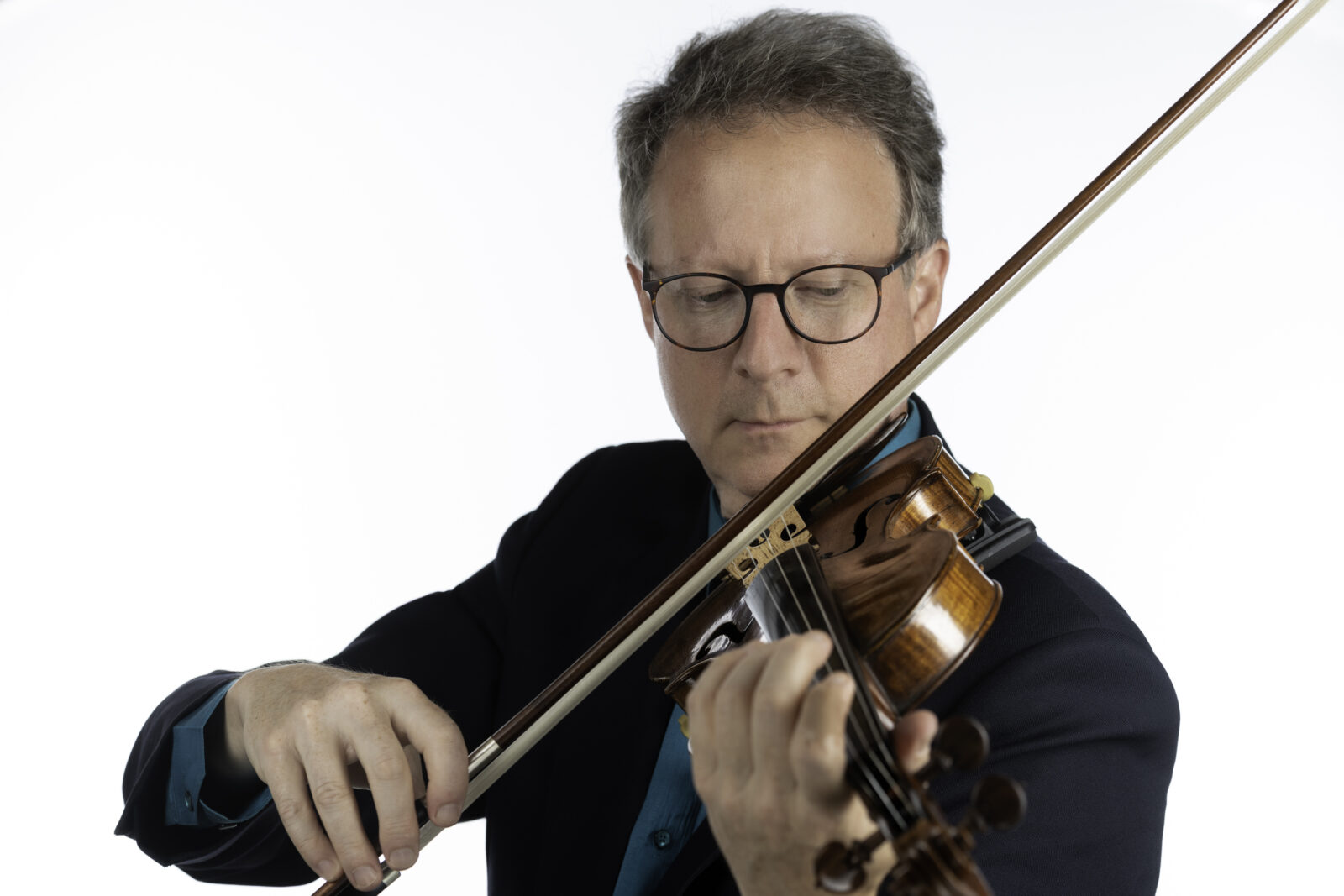
Everything you always wanted to know about bows but were afraid to ask
Join Gabriel Schaff - violinist, scholar and author of "The Essential Guide to Bows of the Violin Family" for an illuminating journey through the history of the bow to everyday tips (no pun intended) about caring for your bow, choosing a new one - and....everything you always wanted to know but were afraid to ask!Read More ↗
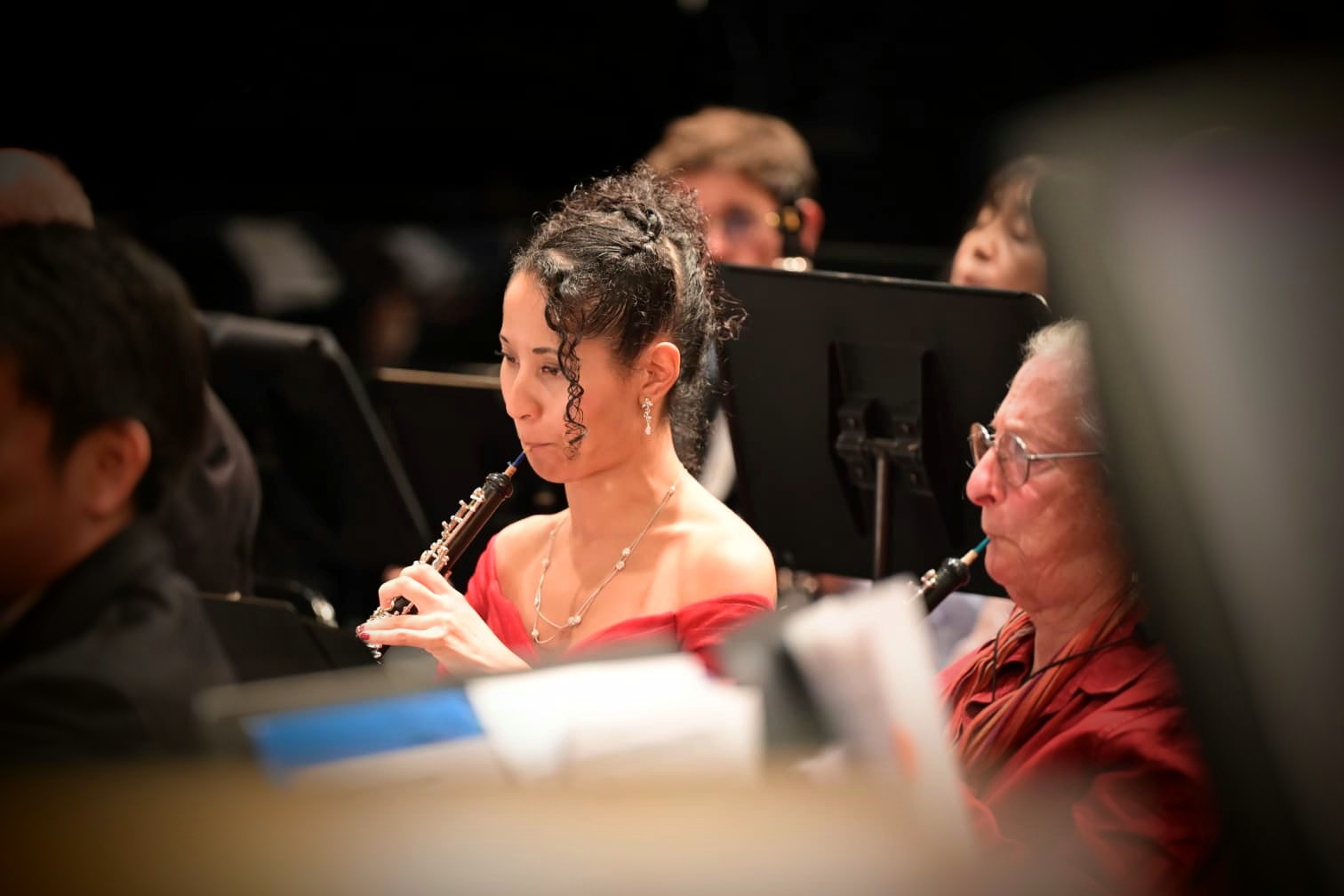
Kayana Jean-Philippe: The serious business of an amateur oboist
When it comes to the oboe, Kayana Jean-Philippe is what you might call a serious amateur – someone who pursues her passion at a high level, but does not make a living at it. One of her most consistent musical outlets has been the United Nations Symphony Orchestra, which she joined 10 years ago and is principal oboist. Another musical outlet is ACMP, which she said has connected her with new people and new musical opportunities.Read More ↗

Announcing the 2025 Holiday Caption Contest Winners!
ACMP's 4th annual Holiday Caption Contest was a success, with 69 captions from 41 ACMP members. This year's winners are Valerie Matthews, Peggy Reynolds, and Matthew Greenbaum. Congratulations to everyone who came up with so many wonderful captions for this year's cartoon!Read More ↗
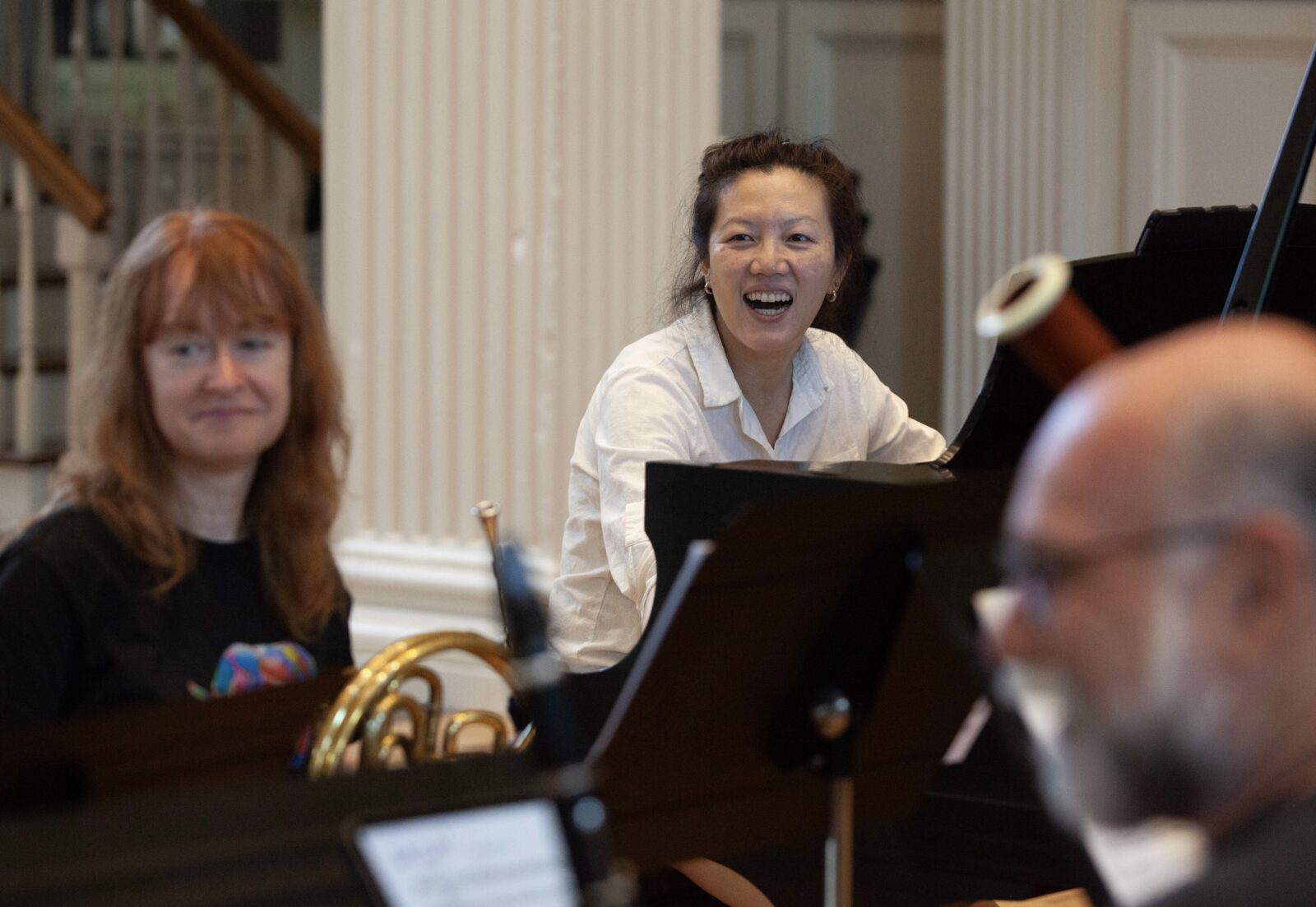
Announcing ACMP’s 2026 Workshop/Community Music Grantees
ACMP is proud to announce its 2026 Chamber Music Workshop and Community Music grantees. This year we awarded $168,000 in grants to 73 chamber music workshops and semester- or year-long programs in 10 countries, and 31 US states. (Photo by Claire Stefani.)Read More ↗

Mystery Donor Reveal: An interview with Louise K. Smith
An anonymous member of ACMP recently spearheaded a fundraising initiative for ACMP in the two week lead-up to Giving Tuesday, offering a $25 gift for each donation received from November 18, 2025 through Giving Tuesday (December 2.) This mystery donor just revealed her identity: Thank you, Louise K. Smith! I asked Louise some questions about her background as a pianist, involvement with ACMP over the years, and about her recent matching grant idea.Read More ↗
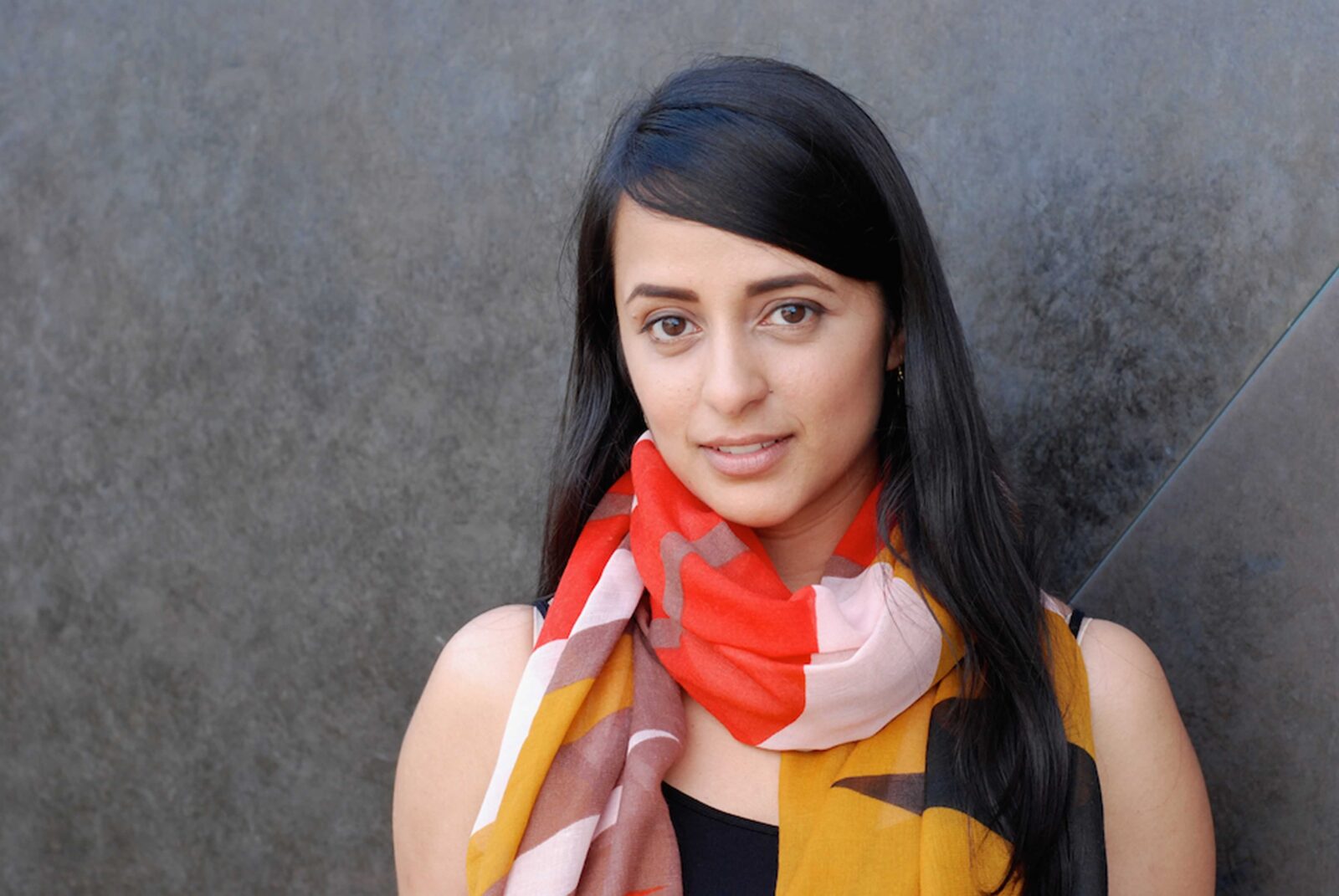
A Bridge from West to East – The Chamber Music of Reena Esmail
After a recent visit to her father's hometown in India, ACMP member pianist Sonya Subbayya Sutton returned to the United States with a renewed curiosity about her Indian culture and music. This led her to explore the music of Indian American composer Reena Esmail. Read about Reena's own voyage of discovery in Indian music and check out links to her scores and recordings.Read More ↗
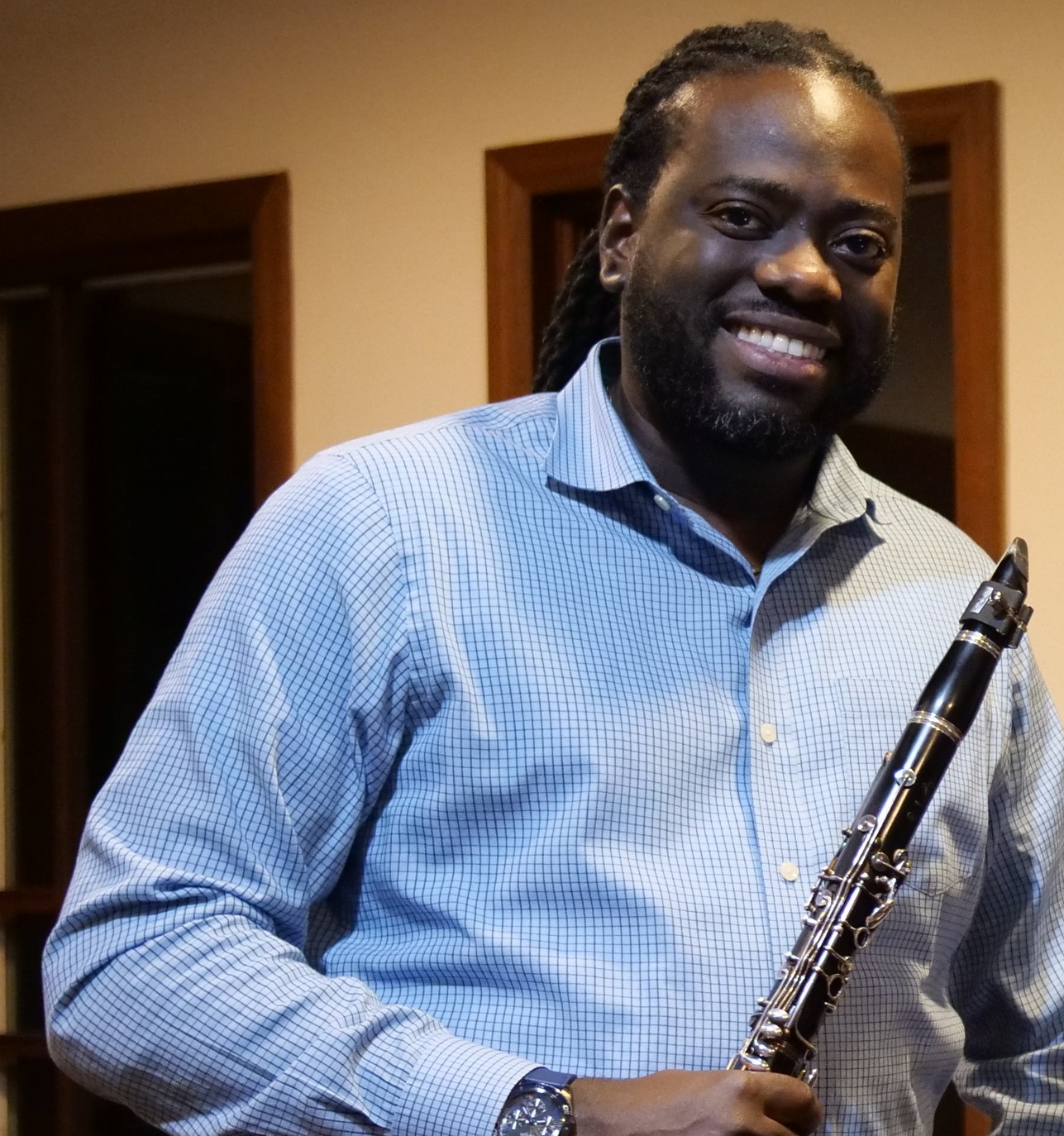
ACMP Member of the Month: Kwame Lewis
Kwame Lewis is not your typical accountant. Born and raised in Trinidad, he emigrated to the United States in 2003 at the age of 23 and set about building his career. Along the way, he lived in the Washington area for an extended period, got married, had two boys who are now 5 and 3 years old, and since 2019 has lived with his family in Melrose, Mass., near Boston. One constant through his journey, though, has been his love of the clarinet and chamber music.Read More ↗
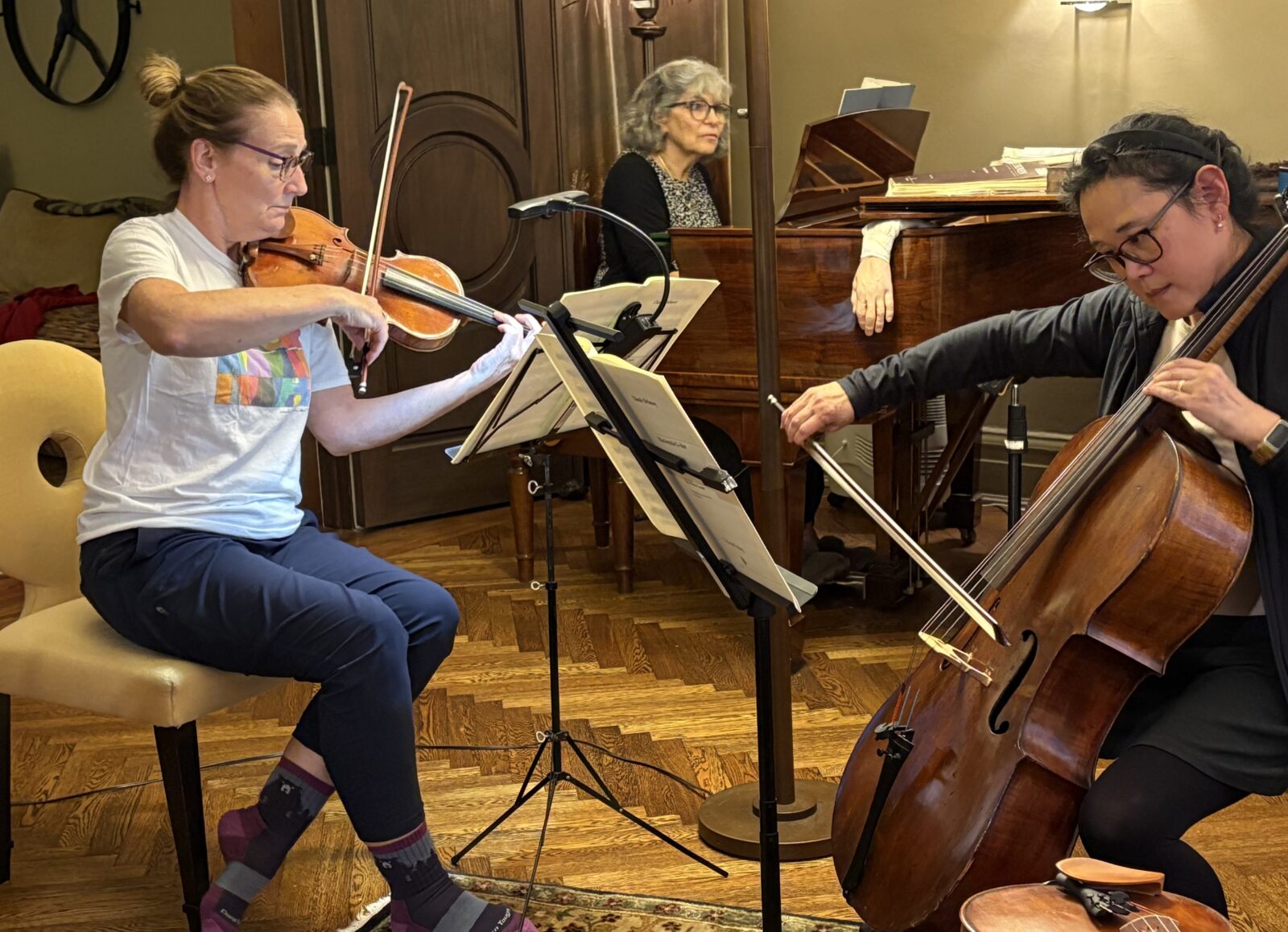
Chamber music for a cause: amateur musicians support Music for Food
ACMP member pianist and violist Arlene Hajinlian is as active a chamber music organizer as she is in sharing her time and space for social causes. This Thanksgiving holiday weekend she came up with a way for adult amateur chamber musicians to have a lot of fun while raising money to support New Yorkers in need: three consecutive chamber music parties as a benefit for Broadway Community through Music for Food.Read More ↗
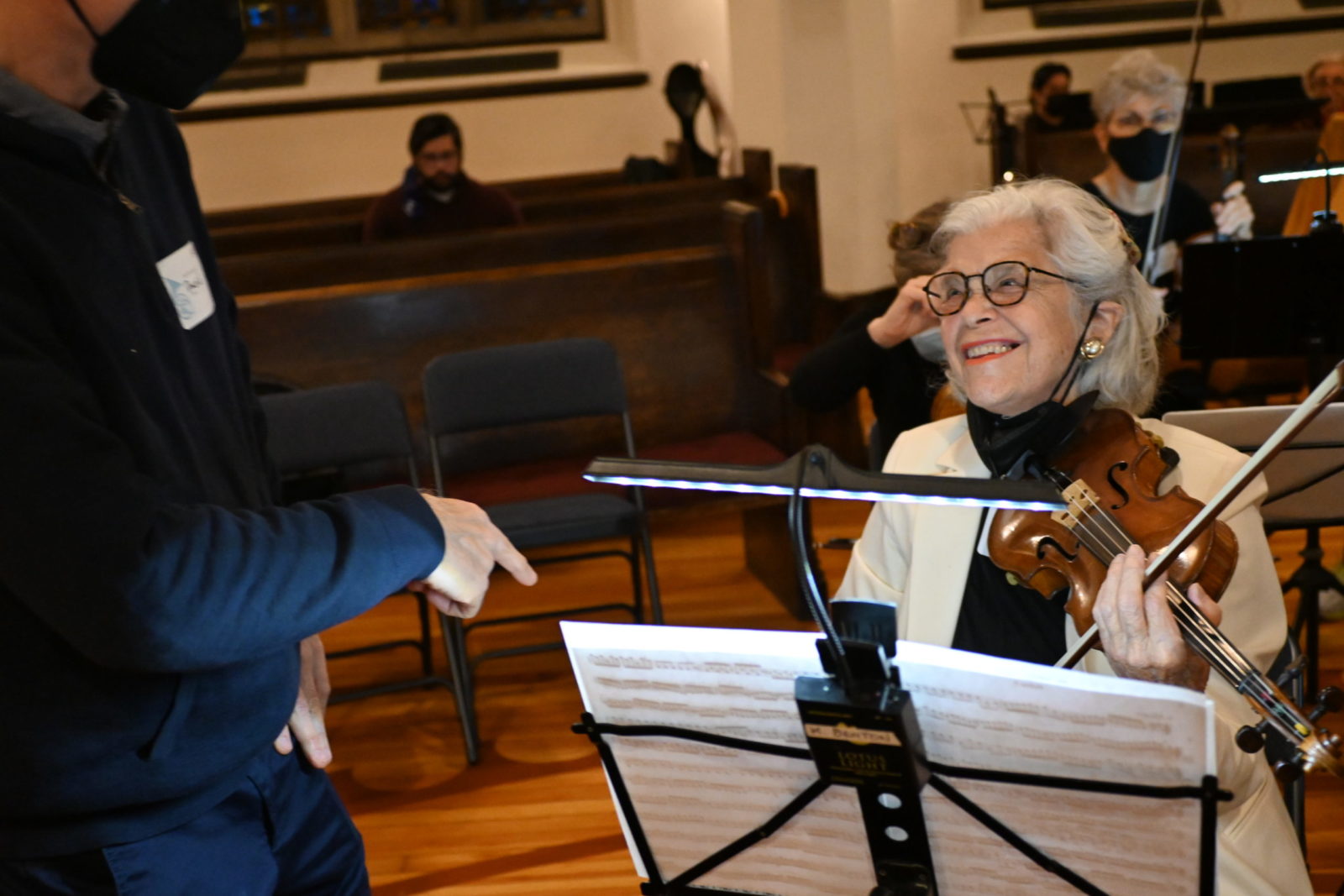
Remembering Kate “Kitty” Bigelow Benton (March 29, 1935 – November 2, 2025)
ACMP mourns the loss of Kitty Benton (1935-2025), a former board member, board secretary and longtime editor of the ACMP newsletter. Read about Kitty's life and watch a video of Kitty telling her favorite stories about ACMP in June 2021.Read More ↗
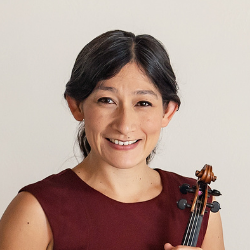
New Video – Meet The Artist: Harumi Rhodes
ACMP Executive Director Stephanie Griffin hosts a lively Zoom conversation with violinist Harumi Rhodes about her musical upbringing and career with the world-renowned Takács Quartet.Read More ↗
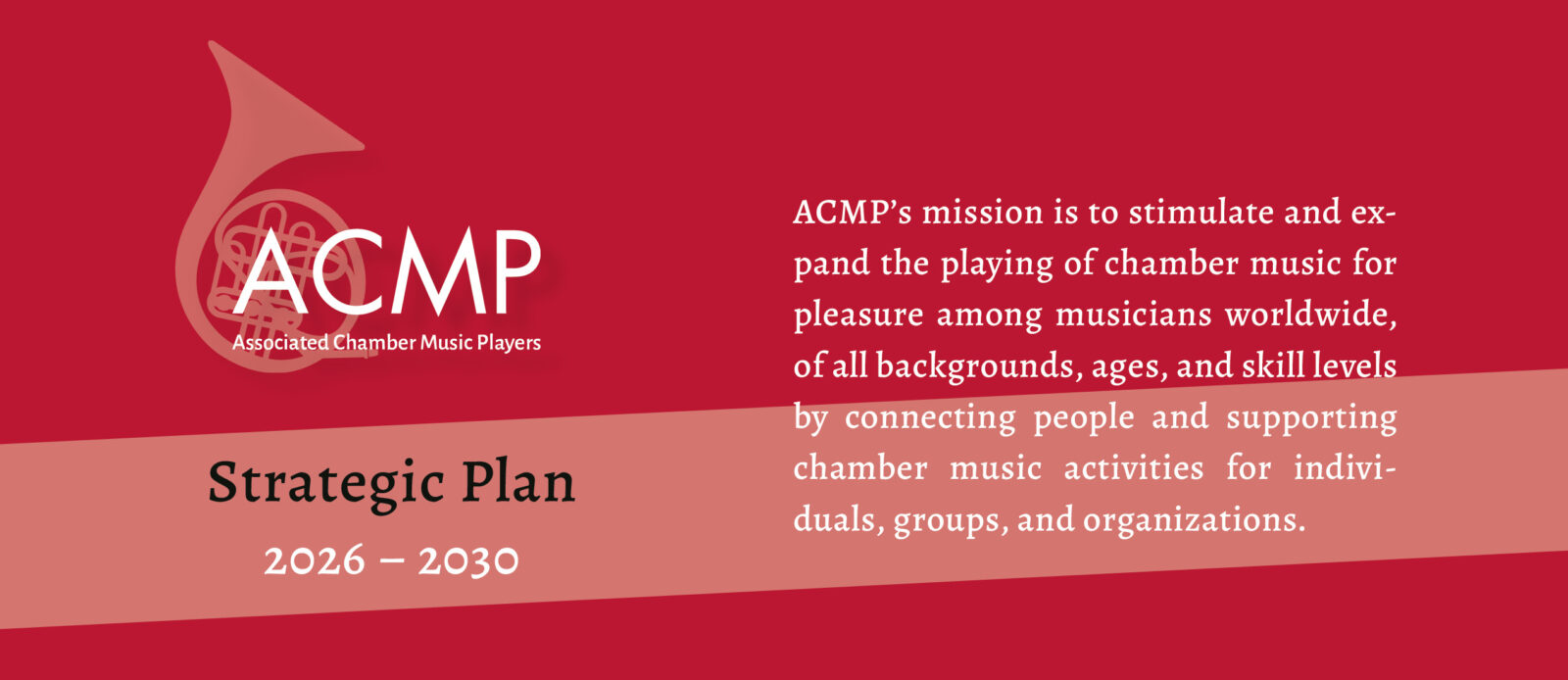
ACMP Strategic Plan for 2030
For the past several years, ACMP’s membership has grown dramatically, as has the popularity of its programs. Building on this momentum, ACMP’s Board and Executive Director completed a strategic plan to chart a course for the organization for the next five years. ACMP’s Board and Executive Director developed a new vision for the organization and a plan to strengthen member services, grants, operations, and finances to advance ACMP’s mission by 2030 and beyond.Read More ↗
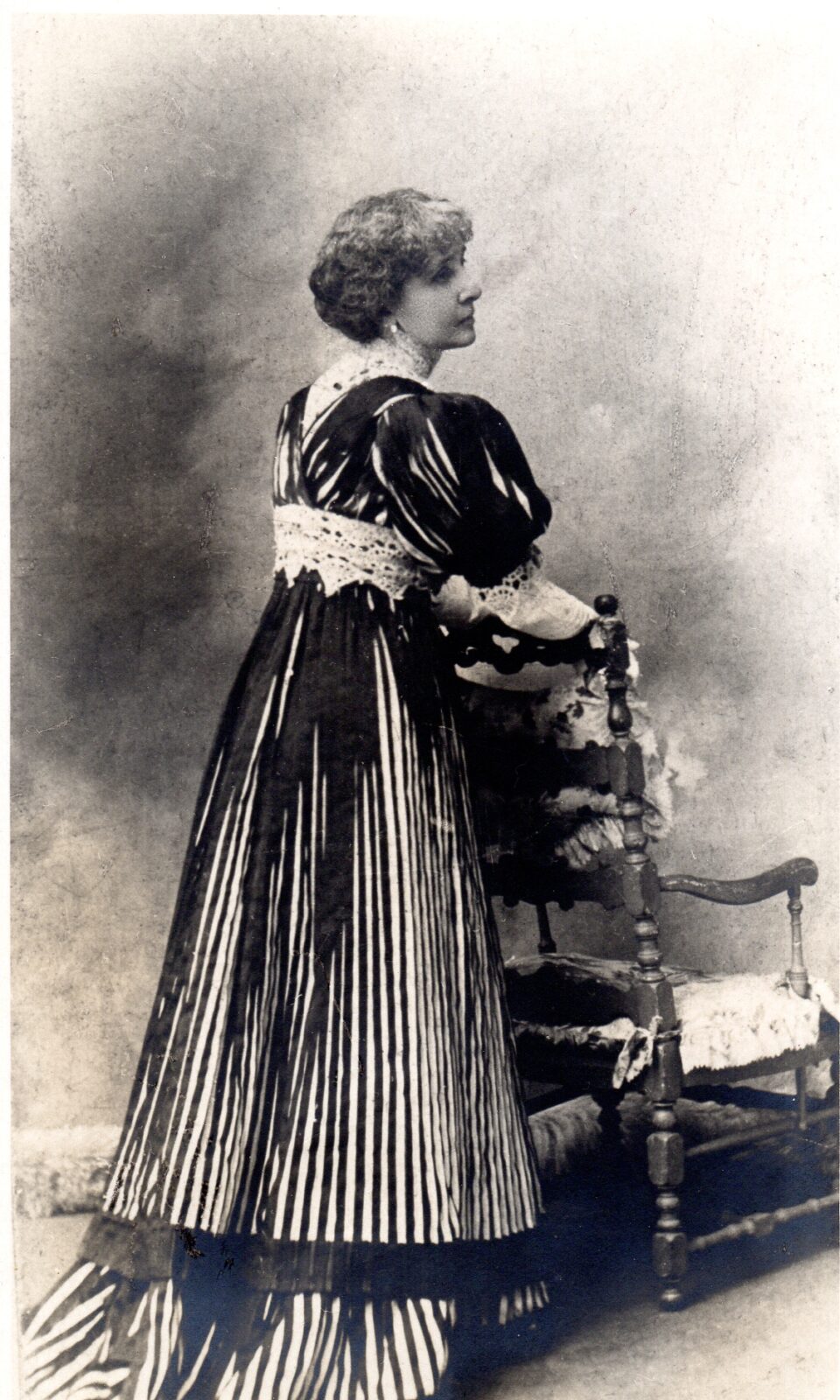
Drab, Inconspicuous, and Quiet No More
Washington, D.C.area pianist and choral conductor Sonya Subbayya Sutton is a passionate advocate of the work of women composers. Read about some of her favorite women composers and discover new chamber repertoire from her list.Read More ↗
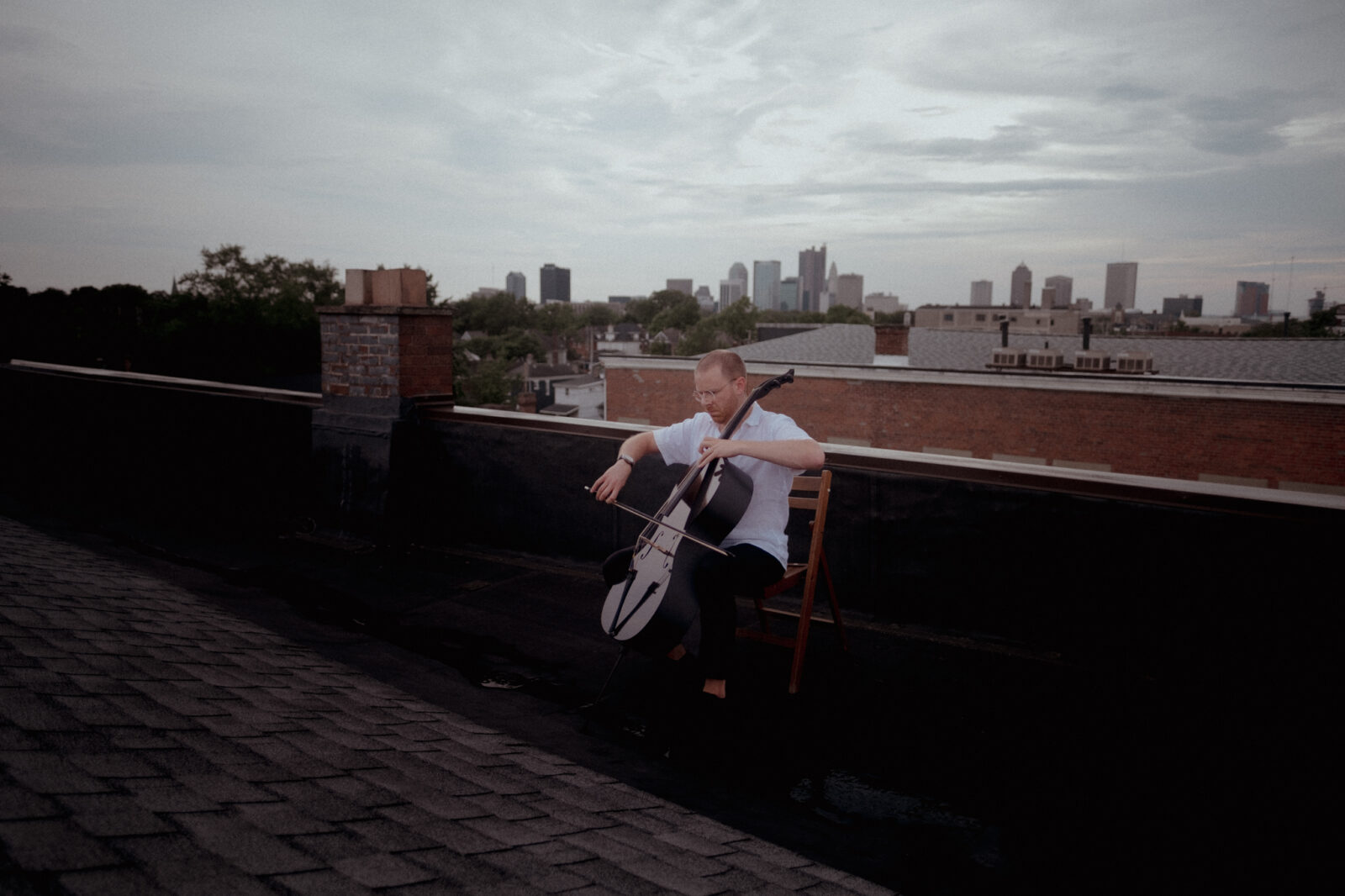
Andrew Brush: An amateur cellist with a global reach
After ACMP’s modest beginnings nearly 80 years ago, ACMP has grown to have a global membership, and perhaps nobody embodies this boundary crossing more than Andrew Brush. With his cello in tow, he splits his time between his home in Columbus, Ohio, and Buenos Aires, with visits to Europe and Istanbul, where his wife is from. Along the way, he has developed diverse musical interests, with influences ranging from Argentina to Mali. We caught up with Andrew recently after he had returned to Columbus, where he serves as a member of the ACMP North American Outreach Council.Read More ↗
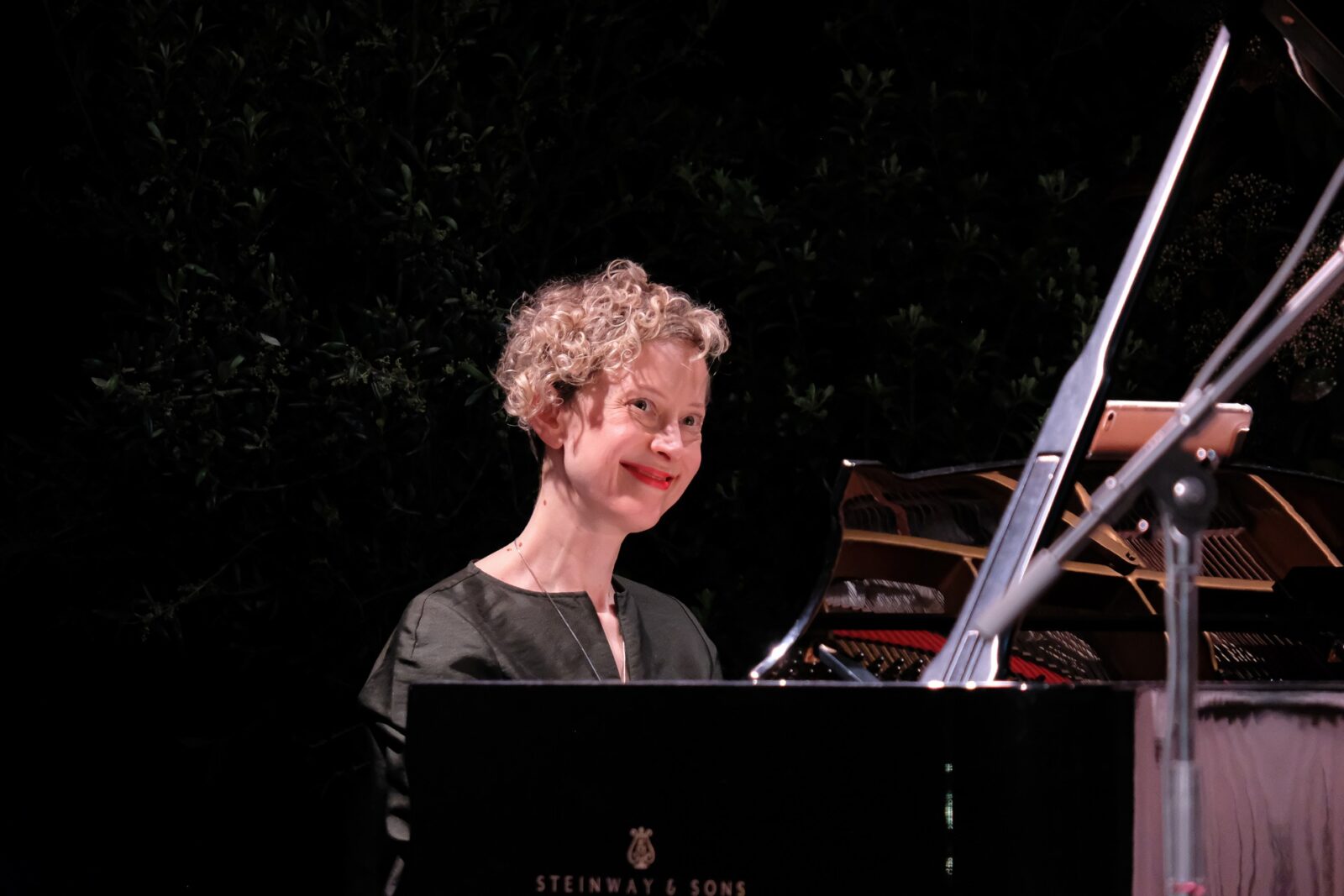
Befriending Performance Anxiety: simple tips for success
Performance anxiety is a universal experience, a survival mechanism that is hard-wired. Many of us react with shaky hands, lack of focus, shallow and fast breathing, rapid heart rate, and even feeling queasy. This is all perfectly natural - our protective sympathetic nervous system comes online to save us from danger, real or imaginary! Join Dr. Xenia Pestova Bennett for a free online webinar about managing performance anxiety on Thursday, October 30th at 6pm UK/Ireland time.Read More ↗